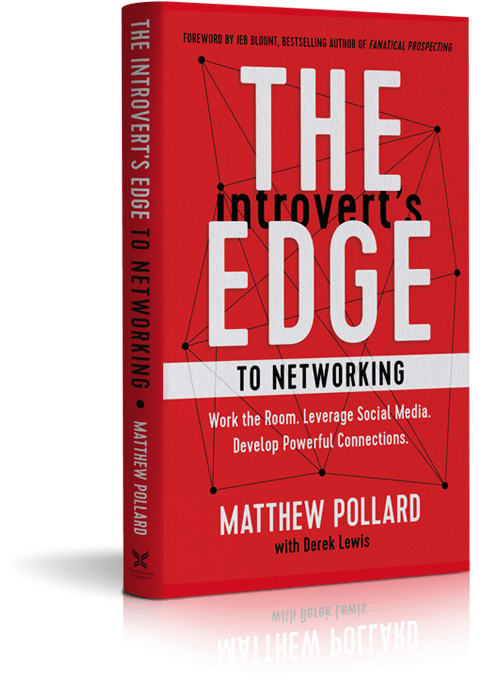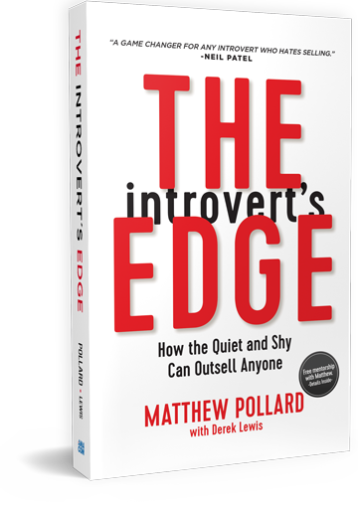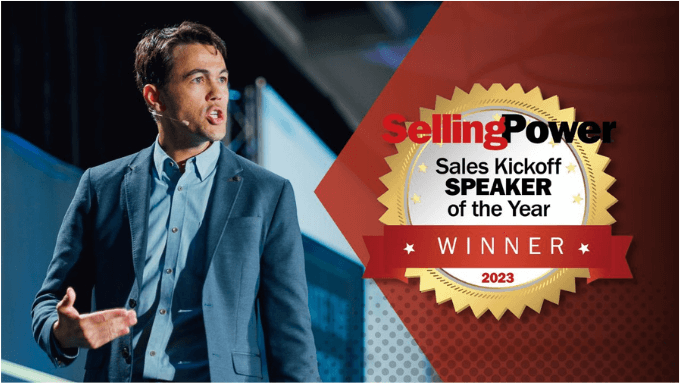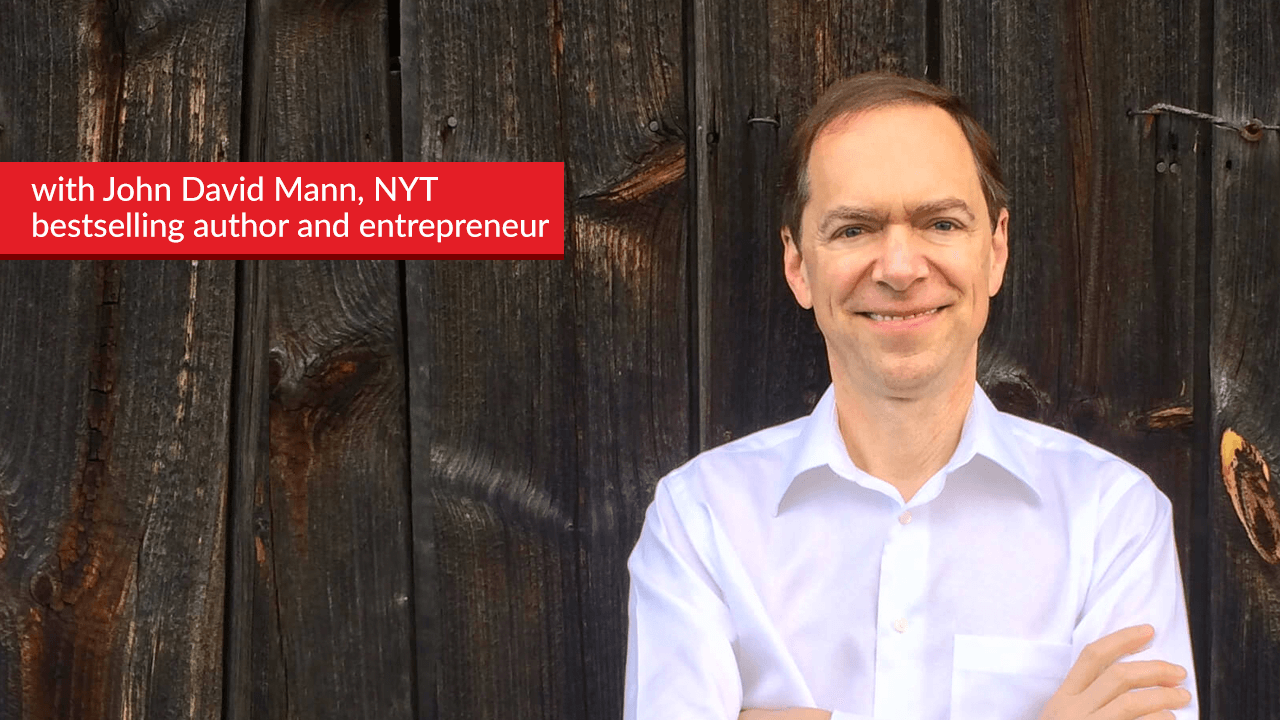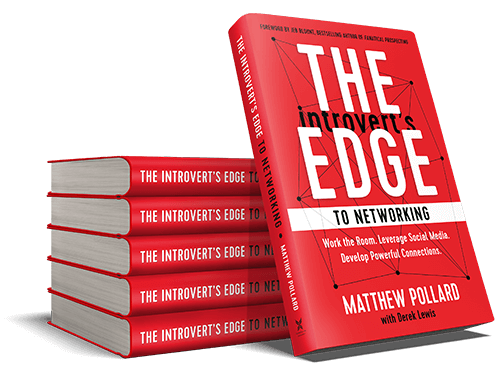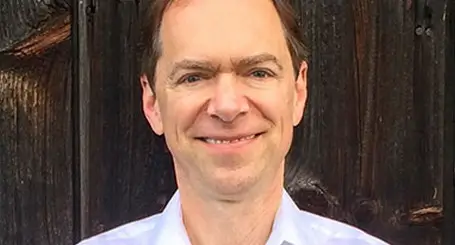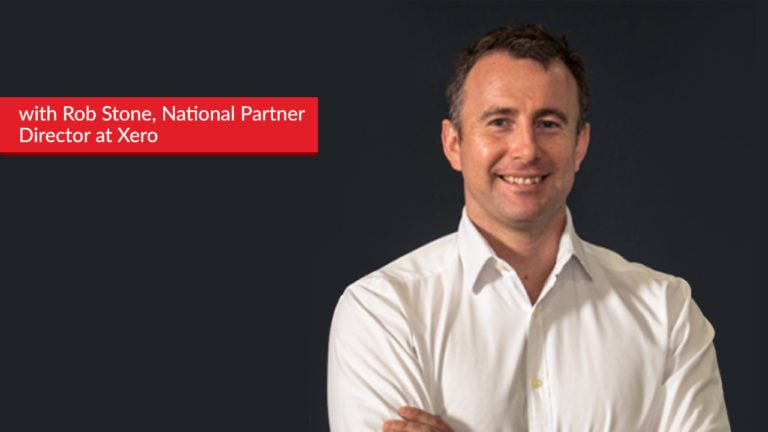Matt: Hello everyone, and welcome back to The Introvert’s Edge. And I’m super excited to introduce my next amazing guest, John David Mann. Who I have– He has written over 2 dozen books. I know we think– Most people are just happy to get one book at some stage in their life, and he has written two dozen. And seven of them are New York Times bestselling books. I mean, that’s amazing. And I – so I’m not going to say anything more about him. I think that’s impressive enough. So John, welcome to the show.
John: Thank you, so great to be here.
Matt: So I have to say – I’m really excited about your story. Because most people would assume that a writer, such as yourself – would spend 90% of their time – 100% of their time hidden away in like a mountain cabin, never having any contact with people. Yet, you’ve been responsible for seven New York Times bestsellers. So I’m really excited to hear about your story, and how your struggles with introversion – how you overcame them, to get to where you are today.
John’s Natural Inclination from Introvert to Extrovert
John: I don’t think that introversion and extroversion is necessarily an absolute either/or thing. Because I think that– And I also think that things can change over time. I mean, as a young man – as a kid, and as a young man – I was very outgoing. I identified myself – my sort of, my identity. My persona within my surroundings. My classmates and all my friends was – I was the class clown. One teacher actually called me that on a report card. I was talkative, I was ebullient. I was– What can I say? The one word – extrovert. I mean, I was an outgoing kid.
And when I went through adolescence, and I spent a year being very depressed. And I had a very difficult time talking to girls. And I was very shy about dating, which I never really did. And just between the time that I was this happy, ebullient kid – and the time that I was this 20-something proto-adult – it– I don’t know if I became a different person?
I don’t think it’s that. I think that we have different layers. And sometimes the early layers kind of rub off a bit, and more of our true self emerges. And I think that at my core – I’ve discovered that I’m a profoundly introverted person. But I had these public skills – in a sense, when I was young.
In my 20s, and even into my 30s – I did a lot of public speaking. I mean I was out in the world. I was– Some friends and I started an alternative high school, and I was kind of the voice of the school. I was the public spokesperson. I was very comfortable on the stage.
But here’s a weird thing. I am still completely comfortable on stage. Put me in front of 5000 people, I am good to go. Put me in front of 15 people, and I am very uncomfortable. As a career journey, and as a day to day mode of existence – what it took me a long time to discover, was where my comfort zone really lay.
Where my skill set really lay. Is that – it takes a lot of energy for me to be with a group of people. It takes– I’m happy being on stage giving the talk, but after the talk – when you mingle – which you’ve got to do, right? The mingling part – it isn’t that I don’t like it. It’s that it’s exhausting for me. It drains me. I know other speakers who are the opposite. It feeds them.
And that’s true with parties or things like networking events. Like many introverts, parties and big events drain me, they don’t feed me. Being with a group of – my maximum group is about two, maybe three? And I’m nourished by that. I love making meaningful connections. Go past that, and I need a – I need like a two-day nap afterwards. So it’s – it’s took me a while. And through a tortured series of different careers, to kind of figure out what my own make-up is. And how it works, and how I can use it in the world.
Introverted People in the Public Eye: Conflicting Personality Traits?
Matt: That’s really interesting, John. Because a lot of people assume that if you’re an introvert, you just can’t be – have a stage presence. You can’t be successful in that genre. And we’ve had a lot of people on the show – that have talked about how they gradually over time, became more comfortable. But to be comfortable in front of lots of people, and then not comfortable in front of a few – there’s only a couple of people that have really said that.
Ryan Deiss from Digital Marketer said the same thing. He said – you could put him in front of a whole group of people, he just imagines he’s talking to this abyss of people – and he’s fine. But if he’s got to speak to 15, he’s climbing the walls. And that’s why he’s always created these really big conferences, ’cause that’s the only way he feels comfortable. It’s funny that you’re– You’re saying a lot of the same things. But – again – the definition, there’s so many definitions of introversion. But yours really is that – when you’re around people, it takes your energy – not feeds you energy. And that means you still have to push yourself to do these things. ‘Cause you know it’s going to be a chore.
John: Yes. It also means – I mean, you’ll hear– If you listen closely, you’ll hear a lot of film actors or television actors in interviews say that they’re really a shy person. And you tend to go, “Oh come on, give me a break. You’re a shy person, and you’re on movie screens 500 feet wide?” They’re not BS’ing, it’s true. They could be very public in terms of appearing before millions of screens, and very awkward in person. It’s – that’s kinda – that’s how it is for me. That’s – or that general dynamic.
And here’s another implication of that, which I think is really valuable. Is that not only may other people not understand that. I mean, if you’re a public person or have a public face in any way – and you say that you’re shy, or you’re introverted. Not only may other people not understand that – you may not understand that yourself. For years, I kind of grappled with this idea of, “Maybe I just don’t like people?” Or, “Maybe I’m antisocial?” I mean, I couldn’t kind of figure it out. And it – looking back now, I realize that it presented a challenge for me to accept myself for who I was. Not to sound too head speak about it.
Because I was, “What’s with me? Do I not like people? Am I antisocial?” No, I’m not antisocial. I don’t dislike people. It’s just that dynamic that you mentioned before. That it saps my – it drains my energy, it takes energy out of me to do that particular dynamic. I love people. I think people are charming. I think they’re lovely. I would love to email with all of them. I’d prefer not meeting in a room with 25, however.
Meaningful Relationships Onstage or One on One
Matt: Yeah, no, I – that makes perfect sense. I think it’s great that you talk about it that way. ‘Cause I think a lot of people are like, “Well – I feel like I’m an introvert, because it’s a chore, or it takes energy from me. But then I can’t be really, can I? Because I can communicate, and I can be in front of a stage and I’m fine.” And there are different levels of introvert. There are people that are situational extroverts.
That’s something I tell coaching clients and potential clients, since part of my role is kind of a business communication coach with my introvert clients. You can be an introvert but also really good at doing what it takes to build a personal brand and those self promoting activities.
When you have to do those extroverted activities, that you do comfortably – do you still have to muster the energy to do that and psych yourself up to do that? Or are you comfortable just to say, “Yeah sure, I’ll do that?” Or do you still pick and choose what extroverted activities, and whether it’s important enough to do?
John: The answer to that is – by and large, yes. I do need to– Psych myself up is not quite right. And it’s not rev myself up. Is I sort of need to get in that space. Get that preparation. I love to do talks when I’m really prepared. There have been times in my life where I was so in the groove that I could just drop everything and just go and be fine. But mostly, I need to really kind of have my – all my ducks in a row, and have everything lined up and kind of be ready to do it.
Something like what we’re doing right now is easy for me. This is not uncomfortable at all. This doesn’t drain me. When we finish talking today, I’ll have a higher energy level than when we started. Because for me, this is like a conversation with you. And I know that there are – could be any number of you’s on the other end of this, seeing this. But for me, it feels – it feels intimate, it feels personal. And that’s not difficult for me. But yes – to answer your question – those public things, oh I have to get ready for that.
Introverts Tend to Prepare Well
Matt: I actually see that you do a lot of preparation. Just coming into this show, you sent me notes and said, “Here is what I think the topic points should be.” Or, “Here are some of the things that we could discuss.” And I think that that sets you up for success in a lot of ways. Because you’ve actually thought through – I told you, I warned you this show was going to be different. I said we’d be talking about you as an introvert and the fact that it’s not the standard podcast.
And what I’ve found is a lot of people that I’ve interviewed, have really thought about what they want to say. Because it’s a new topic. Helping other introverts is important to them. And they’ve also – they understand that it’s something that’s personal to them. And as a result of – because they’re talking about something at an emotional level that’s difficult sometimes, being prepared helps. And so I would love for you to just chat about that.
‘Cause you’ve talked about your preparation for going to do speeches. Your preparation for being on podcast interviews, those sorts of things. Whenever you go to one of those extroverted kind of activities – do you find yourself firstly trying to become more extroverted, or do you find yourself using strategies instead? And then secondly – how much preparation do you do before you do those activities?
John: I generally do a good amount of preparation. It’s just – it’s my nature. I – my first career was as a concert cellist. I grew up in a family of classical musicians. My father was a choral conductor, as well as musicologist. And so it’s – my training and my background is to learn a piece of music. I mean a classical cellist – I’ll learn a Beethoven Sonata, I’ll learn a Bach Suite. I’ll learn that, note for note. I don’t come from a jazz background.
Matt: So no free-styling for you?
John: Yeah. Improvising is not my native milieu. It’s not my native language. That classical preparation and knowing every note – and then being spontaneous within those – the confines of that of those notes. It’s like learning your lines for a play, and then – and then running with it, once you know the part. That’s what it’s like for me. I think I would be very comfortable as a stage actor. Because it’s a similar thing. The notes become a container. When I understand that container completely, then I can slip into that – and I can feel totally relaxed and totally free.
In terms of what do I – you asked a question about sort of strategies or tactics or whatever. About coping with that situation. One thing that I do when I’m in any kind of being in front of people place – is I carefully take my attention off of, “I wonder what I look like? I wonder what impression I’m making. I wonder what they are thinking of me. I consciously have learned to do this. To take myself out of that place, and put myself into the place of – what do I have for them? What do I have of value? What do I have to say, or what do I have to offer? What do they need? Or what would they be able to use? So it isn’t even about self promotion, really.
So it’s really – it’s the go-giver idea. It’s putting my attention on them. Not, “What do they think of me?” It’s like, “What’s going on with them? What can I do for them? What can I offer them?” That puts me in a place of being very, very comfortable.
Don’t Be Afraid of Self Promotion!
Matt: You’ve done an amazing job at branding yourself, and focusing on getting your name out there. I mean, you’re a ghostwriter. You shouldn’t have your name out there where everyone knows it. And you’ve got books that you’ve co-authored, you’ve got books that you’ve written in partnership with other people. And then books that you’ve ghostwritten. But very few people get the honor of putting their name on other people’s books, other people’s ideas – and being a writer in such high demand. And you could quite easily hide away now inside your office, and people would reach out to you.
But you still do so many different things. Where you’ll speak, or you’ll do podcast interviews. And you constantly keep your brand out there. I’m going to ask you – and I’m going to go – in the next session, I’m going to ask you a lot more about the strategies. But I’m going to ask you, why is it that you still participate in those activities? Now that you’ve kind of mastered those strategies, do you actually enjoy it now – and being involved in those processes?
John: I normally don’t. My – and we’ll talk about this more, I know – in the next session. My normal modus operandi, is to be the guy behind the curtain. The guy doing the writing. One reason my name’s in a lot of those books is that many of them are not just me ghostwriting, as in writing that person’s story. But I put a lot of myself into the book. So for example, The Go-Giver, with Bob Burg – that whole series. That isn’t even ghostwriting, that’s like Bob and me 50/50. That’s our joint effort. And even like Brandon Webb, The Navy Seal Sniper, those books – they’re about Brandon, they’re about military life. I’ve never been a sniper, I’ve never been in the Navy Seals. I am not a Seal.
But I still put a lot of my values, my experience, my thoughts in there. So it’s more of a partnership, I think than many ghostwriting situations might be. You know something about that, given what you did with your book – which I love. Maybe we’ll have a chance to talk about that. Thought that was so fantastic, what you did – and my hat’s off to you, and to him. But I normally don’t do a lot of the upfront promotional activity.
Decide What’s Important and Go Self Promote
I do in some cases, like with the Go-Giver books. Just because they are so important to me, and there’s so much of me in them. That when we launch a Go-Giver book, which we’ll do next spring. Bob and I both go out and do a lot of podcasts. For the book I’m doing right now – I’m self-publishing. Which is something I just have not done. And that’s been a huge step. Because it’s meant that I have to step into the place you’re talking about, kind of whole hog.
Matt: Yeah.
John: Which was a big decision for me. So – short answer is – normally I don’t, but sometimes I do.
Matt: So it sounds like – to me, it’s got to be important enough for you to do it?
John: Yes.
Matt: And I think that’s a really important milestone. Because a lot of introverts – if they’re struggling to self promote – maybe the success of their business isn’t as important to them as the fear of doing that? And that can be a misalign. And maybe they’re working on a project or a business or career advancement that they’re doing because they think they can make a lot of money, or because it’s convenient right now.
It seems like you attach yourself to what is important to you. And you put energy behind that. And I think that’s a really – actually, I think in the next session, we’ll spend a little bit of time about working – really discussing how you pick your projects, and what you allocate your energy towards. And I think that would be a really powerful thing to have on a session as well. But John, thank you so much for giving so much great value in this session. I really do appreciate it.
John: It’s absolutely my pleasure. I love this venue, I love the topic, I love the exchange. Thank you, Matt.
Matt: Very welcome, and I’ve been ecstatic to have you. And for everybody that’s watching that’s enjoying this episode, I’d love you to come to the website, and check out the second session, which will be available at the introvertsedge.com/john. And if you’re also really enjoying this content, please subscribe to the podcast. Please post a review. Because the more subscriptions we get, the more reviews we get. The more we raise in the charts in iTunes, and have the opportunity to help more introverts increase their success in both business and in life. Until next time, I’ll see you soon. Cheers.







